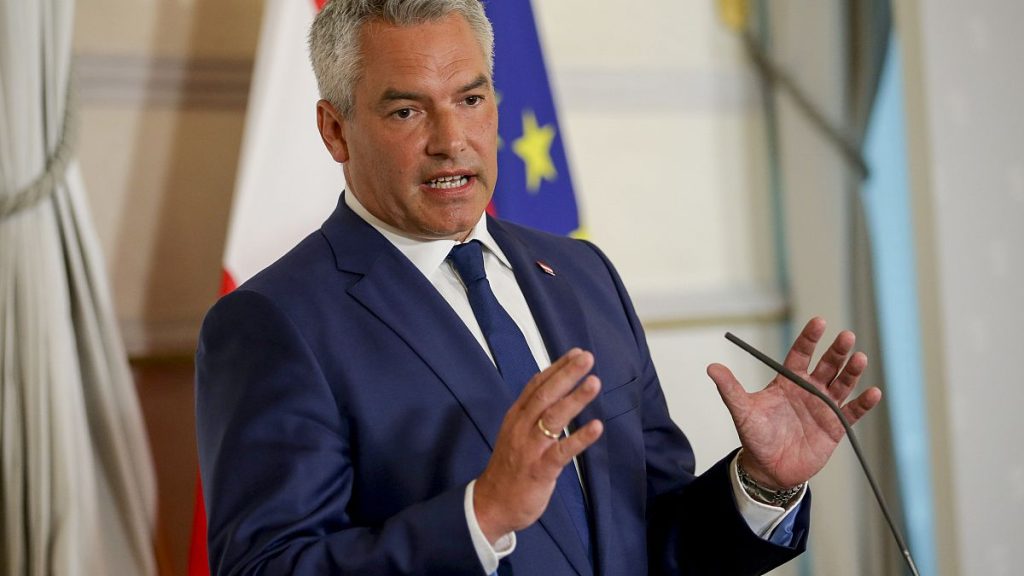Austria’s political landscape is facing a period of uncertainty following the collapse of coalition talks aimed at forming a new government. Chancellor Karl Nehammer, leader of the conservative People’s Party (ÖVP), announced the termination of negotiations with the Social Democrats (SPÖ) on Saturday, citing irreconcilable differences on key policy issues. This breakdown comes after weeks of discussions involving the ÖVP, SPÖ, and the liberal Neos party, an attempt to forge a three-party coalition in the wake of the September national elections where the right-wing Freedom Party (FPÖ) secured a plurality but remained politically isolated. The failure to reach a consensus throws Austria’s political future into question and sets the stage for a potential fresh election, a scenario welcomed by the FPÖ, which has seen its support grow since the initial vote.
The coalition negotiations were initiated after the September elections produced a fragmented political landscape. The FPÖ, led by Herbert Kickl, emerged as the largest party with 29.2% of the vote, a victory attributed to public anxieties surrounding immigration and the rising cost of living. However, Kickl’s controversial past and hardline stance on immigration made him an unacceptable partner for the other mainstream parties. This effectively blocked the FPÖ from forming a government, despite their electoral success, and forced the ÖVP and SPÖ, traditionally the dominant forces in Austrian politics, to explore alternative coalition options. The inclusion of the Neos party in the discussions was seen as a potential path to a stable majority government, but ultimately proved unsuccessful.
The unraveling of the coalition talks began with the unexpected withdrawal of the Neos party on Friday. Neos leader Beate Meinl-Reisinger cited the lack of progress on “fundamental reforms” as the reason for their departure, signaling deep divisions within the negotiating parties despite weeks of discussions. This sudden exit placed significant strain on the remaining ÖVP-SPÖ talks, ultimately leading to their complete breakdown the following day. Chancellor Nehammer expressed his disappointment at the failure to reach an agreement, emphasizing the lack of common ground on crucial issues that prevented a viable coalition from forming. The inability to bridge these differences effectively paralyzed the negotiation process and left Austria facing a renewed period of political limbo.
The key sticking points that ultimately derailed the negotiations remain somewhat unclear, as the involved parties have refrained from publicly disclosing the specific details of their disagreements. However, it is widely speculated that issues such as economic policy, social welfare programs, and the country’s approach to immigration played a significant role in the impasse. The ÖVP, traditionally representing business interests and advocating for fiscal conservatism, likely clashed with the SPÖ’s emphasis on social justice and worker protections. Furthermore, the inclusion of the Neos, a party with a strong focus on market liberalization and limited government intervention, likely added further complexity to the negotiations, widening the ideological gulf between the parties.
The fallout from the failed coalition talks leaves Austria facing the prospect of a fresh election, a scenario that carries both risks and opportunities for the various political actors. The FPÖ, emboldened by their strong showing in September and the subsequent rise in their poll numbers, welcomes a return to the ballot box, confident in their ability to further capitalize on public discontent. For the ÖVP and SPÖ, however, a new election presents a more uncertain path. Both parties have seen their support erode in recent years, and a fresh vote could further solidify the FPÖ’s position as the dominant force in Austrian politics, potentially paving the way for a right-wing government.
The immediate future of Austrian politics remains uncertain. A caretaker government will likely be appointed to manage the country’s affairs until a new election can be organized. This interim period will be crucial for the various parties to reassess their strategies and attempt to regain public trust. The outcome of a future election will have far-reaching consequences for Austria, shaping its domestic policies and its position within the European Union. The current political instability underscores the deep divisions within Austrian society and the challenges facing the country as it navigates complex issues such as economic uncertainty, migration, and the rise of populism.














